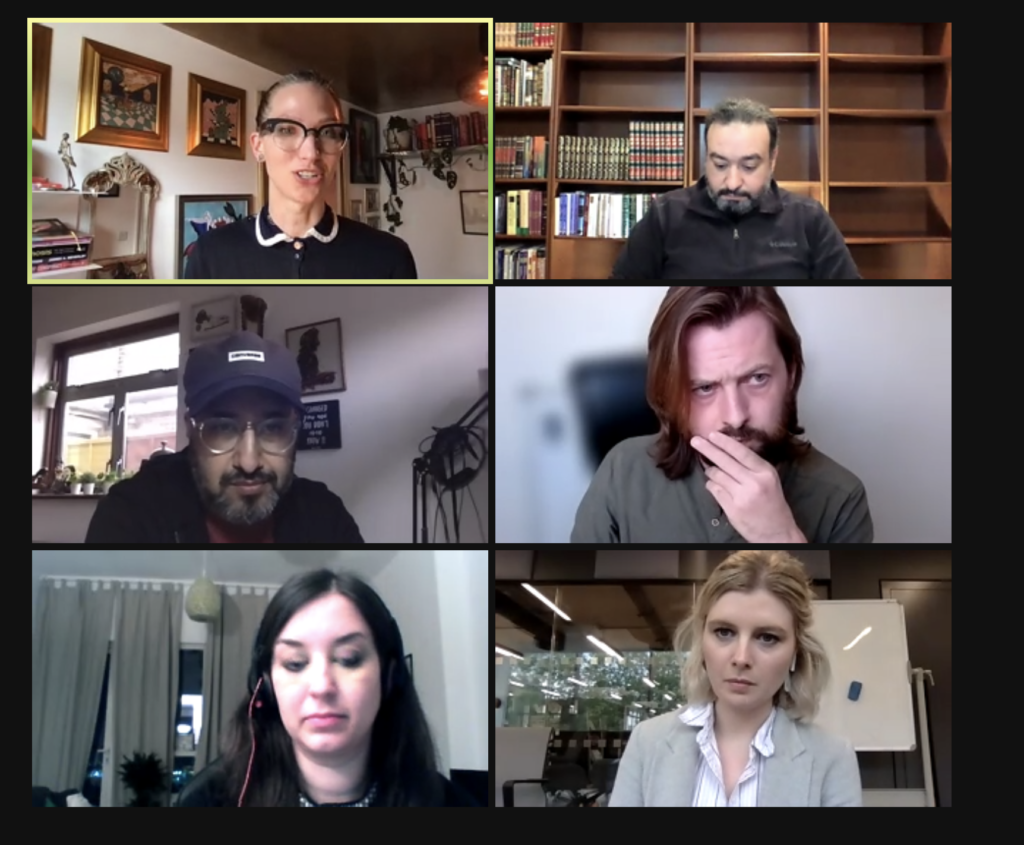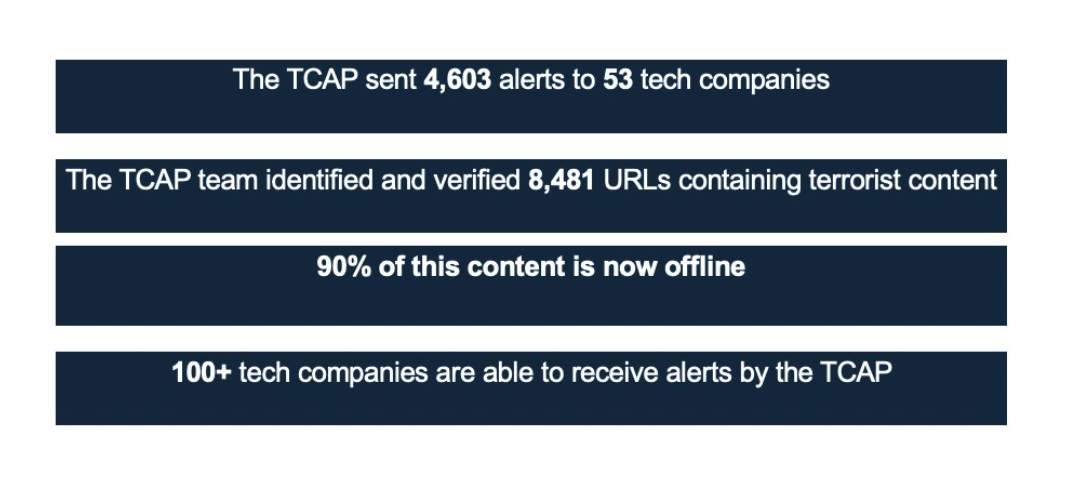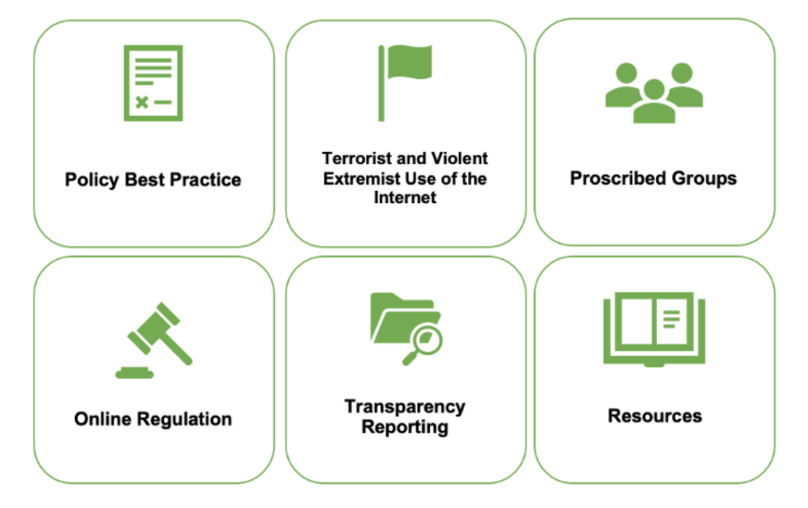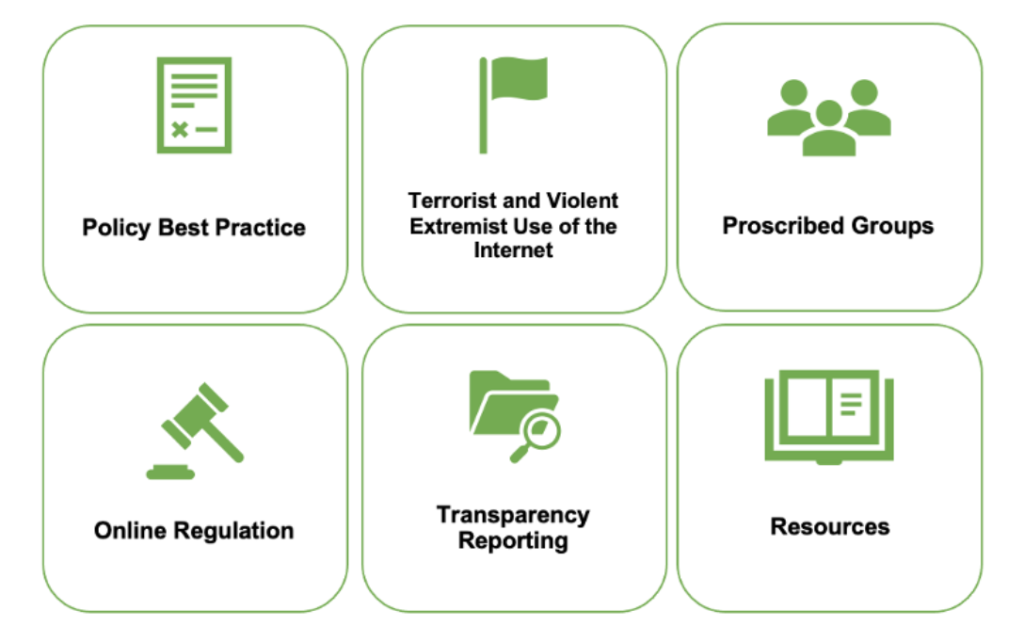May 2021 Update
Webinars
- Thank you to everyone who tuned in for the TAT & GIFCT E-learning Webinar Series on “The Nuts and Bolts of Counter Narratives: What works and why?"
If you were unable to attend the webinar and would like to access a recording, please get in touch with us at contact@techagainstterrorism.org
Agenda
- Sara Zeiger, Program Manager Research and Analysis, Hedayah
- Munir Zamir, PhD Candidate at the University of South Wales
- Tarek Elgawhary, Founder, Making Sense of Islam; CEO, Coexist Research International
- Ross Frenett, Founder & CEO, Moonshot CVE
- Moderators: Erin Saltman, Director of Programming, GIFCT; Anne Craanen, Research Analyst, Tech Against Terrorism

The Terrorist Content Analytics Platform
- A special edition of the TCAP newsletter is out to mark the 6-months anniversary of the TCAP! We provide an overview of the TCAP’s achievements over the last 6-month and highlight our policies, latest statistics and principles. We are proud to announce that over the last 6 months:

- Tech Against Terrorism are proud to announce that on its second anniversary that we are supporting the Christchurch Call to Action with the TCAP expanding its inclusion policy to include material produced by the Christchurch attacker, and will alert copies of the attacker's manifesto and livestream to tech companies.
- We thank the government of Canada for their support in building the TCAP, and for Prime Minister Trudeau in mentioning the TCAP during his remarks at the Christchurch Call to Action anniversary event on 14 May.
- This week we hosted our May sessions of the TCAP office hours. This is one of the steps we are taking to ensure that the platform is developed in a transparent manner. If you would like to access a recording of these sessions, you can reach out to us at contact@techagainstterrorism.org. These events occur on a monthly basis, make sure to follow our TCAP account on Twitter to not miss out on registering for future events!
Speaking Events
- Tech Against Terrorism’s Director, Adam Hadley, and Research Analyst and Policy Lead of the Terrorism Content Analytics Platform (TCAP), Anne Craanen, presented on the TCAP for the Digital and Social Media Action Group convened by the Global Coalition Against Daesh.
- Our Research Analyst and Policy Lead of the TCAP, Anne Craanen, presented at the Researcher Ethics and Safety panel at GNET’s first annual Conference. She spoke about the ethical and security principles that guide the development of the TCAP and the wider work of Tech Against Terrorism.
Stakeholder Processes
- We have recently published a summary of our work and areas of research for the first half of 2021, this can be accessed here.
- We published a blogpost detailing the support we provide to smaller tech platforms via our Mentorship programme and the results it has yielded so far. Since 2018, Tech Against Terrorism has mentored 25 tech companies to help them tackle terrorist use of their platforms whilst respecting human rights. You can read more on this, as well as on how to join our membership programme, here.

- We published a statement on the UK draft Online Safety Bill. Our main concerns are that the future of smaller platforms in the UK remains uncertain given the lack of resources to fulfil the obligations of the bill. We feel more support is required for smaller platforms as they continue to be the main target of terrorist exploitation while also emphasise the need for clearer definitions. You can read the full statement here.
Media coverage
- Our Director, Adam Hadley, discussed the UK's Online Safety Bill and reiterating its relative blind-spot for smaller tech platforms on BBC News on the 12 May.

- Our Director, Adam Hadley, also wrote an article for Wired providing a threat assessment of terrorist use of smaller platforms and the decentralised web. He also suggested changes in the designation processes for terrorist groups and a need to apply existing laws more effectively to combat online terrorist content.
- Our parent organisation, The Online Harms Foundation, was quoted in a recent Times article on the UK’s Online Safety Bill and the minimum age requirements enforced upon social media companies.
What's up next?
- Our next TAT & GIFCT E-learning Webinar Series, “APAC in Focus: Regional Responses to Terrorist and Violent Extremist Activity Online”, will take place on Thursday, 24 June, 3pm BST.
Agenda
- Maya Mirchandani, Senior Fellow at the Observer Research Foundation, and Assistant Professor of Broadcast, Journalism and Media Studies at Ashoka University
- Shashi Jayakumar, Head of the Centre of Excellence for National Security at S. Rajaratnam School of International Studies
- Nawab Osman, Head of Counter-Terrorism and Dangerous Organizations, APAC at Facebook
- Moderators: Deeba Shadnia, OSINT Analyst, Tech Against Terrorism; and Nayanka Paquete Perdigão, Programme Associate, GIFCT
Register here.
- Stay tuned for The Online Regulation Series Handbook, collating all of our blogposts, additional analysis and recommendations on global online tech regulations, as well as a comprehensive list of all the resources you need to understand the fast-changing landscape of online regulation.
- We are excited to announce that an updated version of the Knowledge Sharing Platform (KSP) will be re-launched to tech platforms soon. The KSP is a collection of interactive tools and resources designed to support the operational needs of smaller tech platforms. The KSP is a “one stop shop” for companies to access practical resources to support their counterterrorism and transparency efforts. It is a free platform which contains research and guidelines on topics including: policies and content standards, terrorist & violent extremist use of the internet, proscribed groups, online regulation, and transparency reporting. Stay tuned for further announcements about the launch date!

Tech Against Terrorism Reader's Digest – 4 June
Our weekly review of articles on terrorist and violent extremist use of the internet, counterterrorism, digital rights, and tech policy.
Top stories
- Facebook is changing its content moderation rules around politicians in the wake of their Oversight Board’s decision to uphold its ban on former US President Trump. This marks the end of "special treatment" given to politicians online, now the same rules will "apply to all users".
- The French Parliament passed its anti-terrorism bill at first reading. The law includes elements of the emergency measures implemented following the 2015 terror attacks. The law notably incorporates “algorithmic analysis” of connection data and URLs.
- Authorities in Texas arrested a man on Friday 28 May on charges of “making a terrorist threat”, with an alleged plan to carry out a mass shooting at a Walmart store in San Antonio.
- Instagram changed the algorithm used in its Story features following accusations of the platform suppressing “pro-Palestinian messages” during the recent conflict in Gaza.
- Facebook employees are circulating an internal petition calling for the company to investigate content moderation systems in the aftermath of the most recent conflict in Gaza, complaining that “Palestinian’s and their allies’” voices were being censored.
- The UK’s Independent Reviewer of Terrorism Legislation is calling for automatic life sentences for terrorist attack planners.
Tech Policy
- “The EU is no longer Big Tech’s biggest threat”: Natalia Drozdiak approaches the recent decision by US President Biden’s administration seeking to take a “tougher line” on tech. The US and EU are now working closely on privacy and tech regulation as an EU-US Trade and Technology Council is likely to be announced soon. Drozdiak emphasises that US lawmakers are pushing for more stringent measures which could have wider ramifications for the tech sector. Still, European enforcement has not disappeared, with several new regulations proposed by the EU to tackle illegal and terrorist content online. Tech companies are facing challenging in the US whilst having to adapt to EU requirements. (Drozdiak, Bloomberg, 01.06.2021).
Tech Against Terrorism wrote on the EU TERREG Laws in VoxPol and European tech regulations as part of our Online Regulation Series.
- “How censorship became the new crisis for social networks”: Casey Newton discusses the issue of alleged “censorship” online with two paths being outlined. The first is concerns over governments’ “draconian methods” to control what their citizens post online, with what was the tactic of more authoritarian states now spreading to democracies too according to Newton. The second regards the platforms themselves, and where “big tech” has previously courted criticism of conservatives, there are now concerns from the left of the political spectrum over increasing censorship. Newton argues that with the “increasing importance” of social media as a venue for protest and debate in a world where authoritarianism is on the rise, expectations persist over these companies living up to this ideal. (Newton, Platformer, 02.06.2021).
Far-Right Violent Extremism and Terrorism
- “At least 16 members of UK military referred to anti-extremism scheme”: Ben Quinn reports that at least 16 UK armed forces personnel have been investigated over the past two and a half years under the country's Prevent scheme, the majority being over suspected "far-right extremist activity" according to Prevent. This comes after several high-profile exposures of far-right violent extremism elements in the British armed forces, including a member of the Identitarian Movement employed as naval personnel to work on the Trident nuclear submarine. For Quinn, this is indicative of the blind-spot some organisations have for “far-right” activity, while for others it demonstrates the intention of these elements to infiltrate the armed forces. (Quinn, The Guardian, 31.05.2021).
For any questions or media requests, please get in touch via:
contact@techagainstterrorism.org
- News (240)
- Counterterrorism (54)
- Analysis (52)
- Terrorism (39)
- Online Regulation (38)
- Violent Extremist (36)
- Regulation (33)
- Tech Responses (33)
- Europe (31)
- Government Regulation (27)
- Academia (25)
- GIFCT (22)
- UK (22)
- Press Release (21)
- Reports (21)
- US (20)
- USA (19)
- Guides (17)
- Law (16)
- UN (15)
- Asia (11)
- ISIS (11)
- Workshop (11)
- Presentation (10)
- MENA (9)
- Fintech (6)
- Threat Intelligence (5)
- Webinar (5)
- Propaganda (3)
- Region (3)
- Submissions (3)
- Generative AI (1)
- Op-ed (1)

